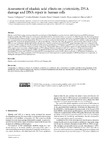Assessment of Okadaic Acid Effects on Cytotoxicity, DNA Damage and DNA Repair in Human Cells

Use este enlace para citar
http://hdl.handle.net/2183/34782
A non ser que se indique outra cousa, a licenza do ítem descríbese como Atribución-NoComercial-SinDerivadas 4.0 Internacional
Coleccións
- Investigación (FCIE) [1228]
Metadatos
Mostrar o rexistro completo do ítemTítulo
Assessment of Okadaic Acid Effects on Cytotoxicity, DNA Damage and DNA Repair in Human CellsAutor(es)
Data
2010-05-26Cita bibliográfica
Valdiglesias, V., Méndez, J., Pásaro, E., Cemeli, E., Anderson, D., Laffon, B., 2010. Assessment of okadaic acid effects on cytotoxicity, DNA damage and DNA repair in human cells. Mutation Research/Fundamental and Molecular Mechanisms of Mutagenesis 689, 74–79. https://doi.org/10.1016/j.mrfmmm.2010.05.004
Resumo
[Abstract] Okadaic acid (OA) is a phycotoxin produced by several types of dinoflagellates causing diarrheic shellfish poisoning (DSP) in humans. Symptoms induced by DSP toxins are mainly gastrointestinal, but the intoxication does not appear to be fatal. Despite this, this toxin presents a potential threat to human health even at concentrations too low to induce acute toxicity, since previous animal studies have shown that OA has very potent tumour promoting activity. However, its concrete action mechanism has not been described yet and the results reported with regard to OA cytotoxicity and genotoxicity are often contradictory. In the present study, the genotoxic and cytotoxic effects of OA on three different types of human cells (peripheral blood leukocytes, HepG2 hepatoma cells, and SHSY5Y neuroblastoma cells) were evaluated. Cells were treated with a range of OA concentrations in the presence and absence of S9 fraction, and MTT test and Comet assay were performed in order to evaluate cytotoxicity and genotoxicity, respectively. The possible effects of OA on DNA repair were also studied by means of the DNA repair competence assay, using bleomycin as DNA damage inductor. Treatment with OA in absence of S9 fraction induced not statistically significant decrease in cell viability and significant increase in DNA damage in all cell types at the highest concentrations investigated. However, only SHSY5Y cells showed OA induced genotoxic and cytotoxic effects in presence of S9 fraction. Furthermore, we found that OA can induce modulations in DNA repair processes when exposure was performed prior to BLM treatment, in co-exposure, or during the subsequent DNA repair process.
Palabras chave
Okadaic acid
Cytotoxicity
Genotoxicity
DNA repair
Human cells
Cytotoxicity
Genotoxicity
DNA repair
Human cells
Descrición
This is a manuscript version of the article.
Versión do editor
Dereitos
Atribución-NoComercial-SinDerivadas 4.0 Internacional
ISSN
1383-5718






